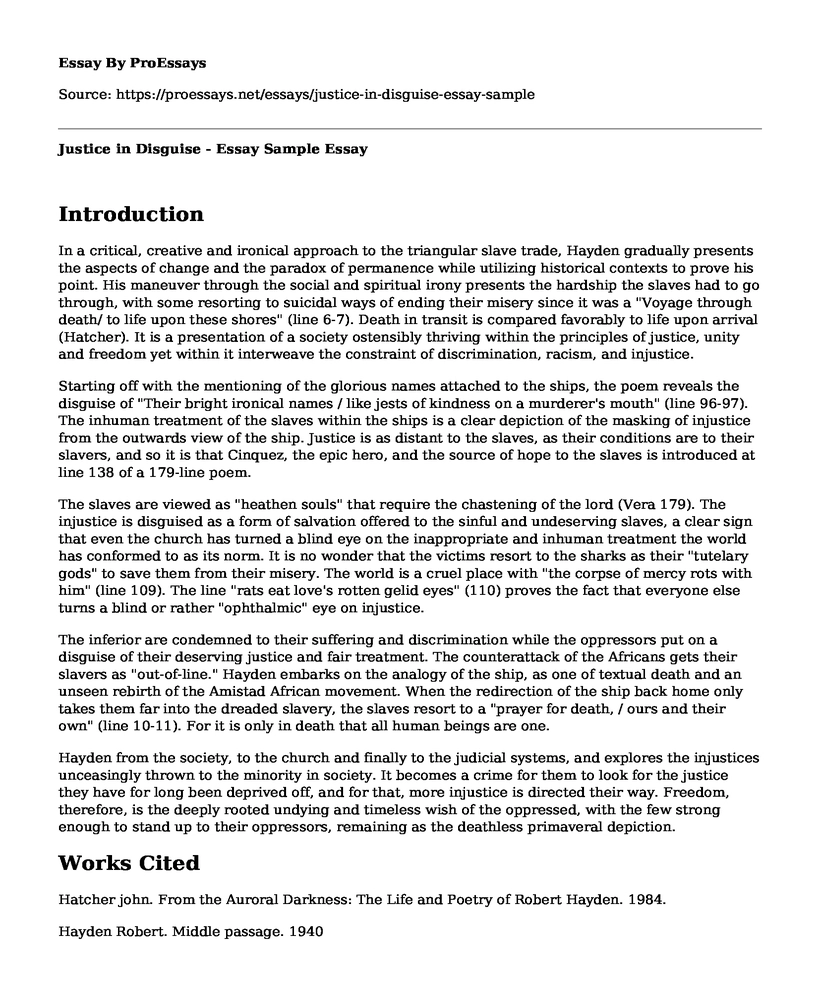Introduction
In a critical, creative and ironical approach to the triangular slave trade, Hayden gradually presents the aspects of change and the paradox of permanence while utilizing historical contexts to prove his point. His maneuver through the social and spiritual irony presents the hardship the slaves had to go through, with some resorting to suicidal ways of ending their misery since it was a "Voyage through death/ to life upon these shores" (line 6-7). Death in transit is compared favorably to life upon arrival (Hatcher). It is a presentation of a society ostensibly thriving within the principles of justice, unity and freedom yet within it interweave the constraint of discrimination, racism, and injustice.
Starting off with the mentioning of the glorious names attached to the ships, the poem reveals the disguise of "Their bright ironical names / like jests of kindness on a murderer's mouth" (line 96-97). The inhuman treatment of the slaves within the ships is a clear depiction of the masking of injustice from the outwards view of the ship. Justice is as distant to the slaves, as their conditions are to their slavers, and so it is that Cinquez, the epic hero, and the source of hope to the slaves is introduced at line 138 of a 179-line poem.
The slaves are viewed as "heathen souls" that require the chastening of the lord (Vera 179). The injustice is disguised as a form of salvation offered to the sinful and undeserving slaves, a clear sign that even the church has turned a blind eye on the inappropriate and inhuman treatment the world has conformed to as its norm. It is no wonder that the victims resort to the sharks as their "tutelary gods" to save them from their misery. The world is a cruel place with "the corpse of mercy rots with him" (line 109). The line "rats eat love's rotten gelid eyes" (110) proves the fact that everyone else turns a blind or rather "ophthalmic" eye on injustice.
The inferior are condemned to their suffering and discrimination while the oppressors put on a disguise of their deserving justice and fair treatment. The counterattack of the Africans gets their slavers as "out-of-line." Hayden embarks on the analogy of the ship, as one of textual death and an unseen rebirth of the Amistad African movement. When the redirection of the ship back home only takes them far into the dreaded slavery, the slaves resort to a "prayer for death, / ours and their own" (line 10-11). For it is only in death that all human beings are one.
Hayden from the society, to the church and finally to the judicial systems, and explores the injustices unceasingly thrown to the minority in society. It becomes a crime for them to look for the justice they have for long been deprived off, and for that, more injustice is directed their way. Freedom, therefore, is the deeply rooted undying and timeless wish of the oppressed, with the few strong enough to stand up to their oppressors, remaining as the deathless primaveral depiction.
Works Cited
Hatcher john. From the Auroral Darkness: The Life and Poetry of Robert Hayden. 1984.
Hayden Robert. Middle passage. 1940
Vera M. Kutzinski."Changing Permanences: Historical and Literary Revisionism in Robert Hayden's 'Middle Passage.'" Callaloo 9.1 (Winter 1986): 179
Cite this page
Justice in Disguise - Essay Sample. (2022, Jul 29). Retrieved from https://proessays.net/essays/justice-in-disguise-essay-sample
If you are the original author of this essay and no longer wish to have it published on the ProEssays website, please click below to request its removal:
- Justification for Formation of Counseling Group to Assist Students Struggling with Alcoholism
- Childhood Obesity Prevention Essay
- Parental Involvement and Achievement Essay
- Case Study on Generation Kill: A Conversation With Stanley McChrystal
- A Civilized Society Is Natural: The Polis and Human Nature in Aristotle's Politics
- George Washington's Three Departments: The Start of Political Rivalry - Essay Sample
- Cybercrime vs. Cyberterrorism: Understanding the Difference - Essay Sample







